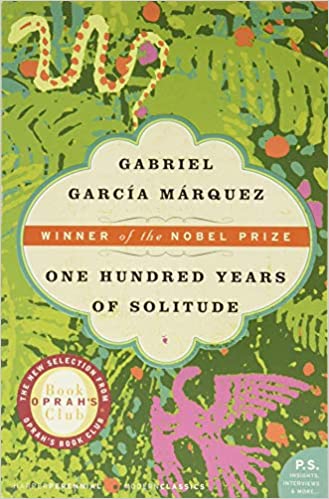One Hundred Years of Solitude
One Hundred Years of Solitude is a landmark 1967 novel by Colombian author Gabriel García Márquez that tells the multi-generational story of the Buendía family, whose patriarch, José Arcadio Buendía, founded the (fictitious) town of Macondo. The novel is often cited as one of the supreme achievements in literature.
The magical realist style and thematic substance of One Hundred Years of Solitude established it as an important representative novel of the literary Latin American Boom of the 1960s and 1970s, which was stylistically influenced by Modernism (European and North American) and the Cuban Vanguardia (Avant-Garde) literary movement.
Since it was first published in May 1967 in Buenos Aires by Editorial Sudamericana, One Hundred Years of Solitude has been translated into 46 languages and sold more than 50 million copies. The novel, considered García Márquez's magnum opus, remains widely acclaimed and is recognized as one of the most significant works both in the Hispanic literary canon and in world literature.
García Márquez started as a journalist and wrote many acclaimed non-fiction works and short stories, but is best known for his novels, such as One Hundred Years of Solitude (1967), Chronicle of a Death Foretold (1981), and Love in the Time of Cholera (1985). His works have achieved significant critical acclaim and widespread commercial success.
Upon García Márquez's death in April 2014, Juan Manuel Santos, the president of Colombia, called him "the greatest Colombian who ever lived."
The magical realist style and thematic substance of One Hundred Years of Solitude established it as an important representative novel of the literary Latin American Boom of the 1960s and 1970s, which was stylistically influenced by Modernism (European and North American) and the Cuban Vanguardia (Avant-Garde) literary movement.
Since it was first published in May 1967 in Buenos Aires by Editorial Sudamericana, One Hundred Years of Solitude has been translated into 46 languages and sold more than 50 million copies. The novel, considered García Márquez's magnum opus, remains widely acclaimed and is recognized as one of the most significant works both in the Hispanic literary canon and in world literature.
About the Author
Gabriel García Márquez (6 March 1927 – 17 April 2014) was a Colombian novelist, short-story writer, screenwriter, and journalist, known affectionately as Gabo or Gabito throughout Latin America. Considered one of the most significant authors of the 20th century, particularly in the Spanish language, he was awarded the 1972 Neustadt International Prize for Literature and the 1982 Nobel Prize in Literature. He pursued a self-directed education that resulted in leaving law school for a career in journalism. From early on he showed no inhibitions in his criticism of Colombian and foreign politics. In 1958 he married Mercedes Barcha; they had two sons, Rodrigo and Gonzalo.García Márquez started as a journalist and wrote many acclaimed non-fiction works and short stories, but is best known for his novels, such as One Hundred Years of Solitude (1967), Chronicle of a Death Foretold (1981), and Love in the Time of Cholera (1985). His works have achieved significant critical acclaim and widespread commercial success.
Upon García Márquez's death in April 2014, Juan Manuel Santos, the president of Colombia, called him "the greatest Colombian who ever lived."

